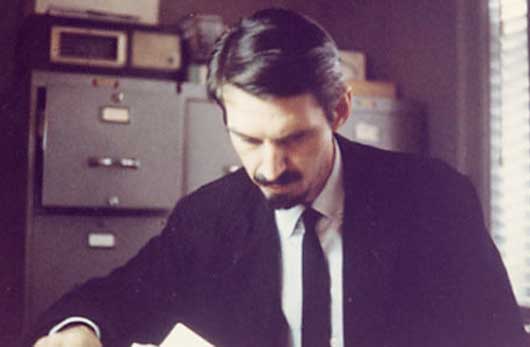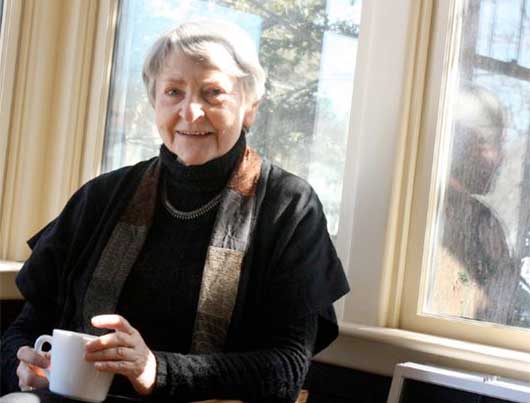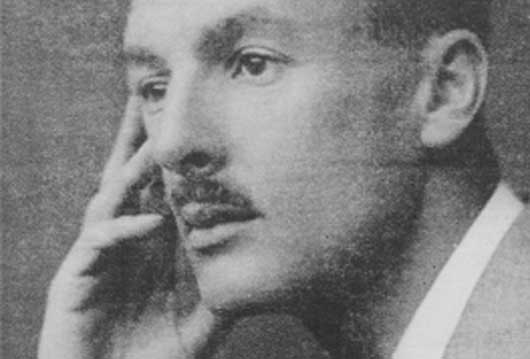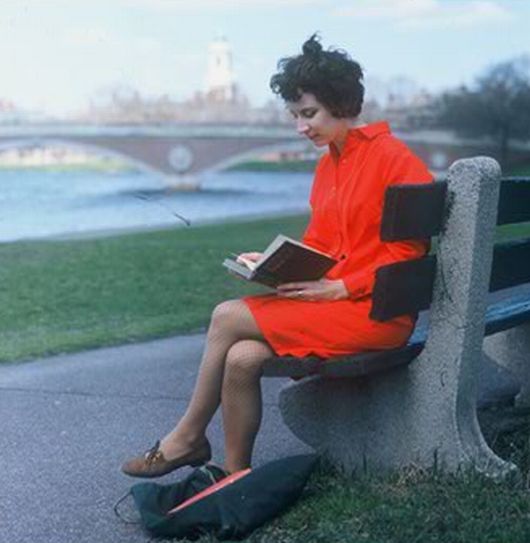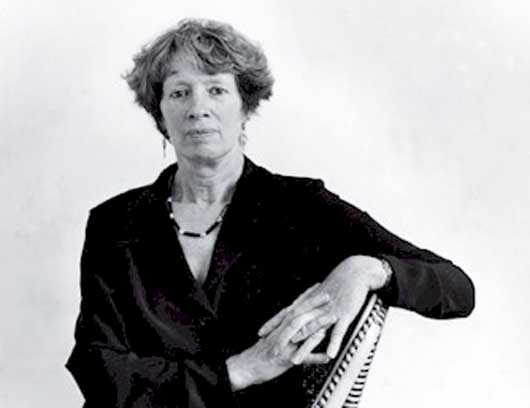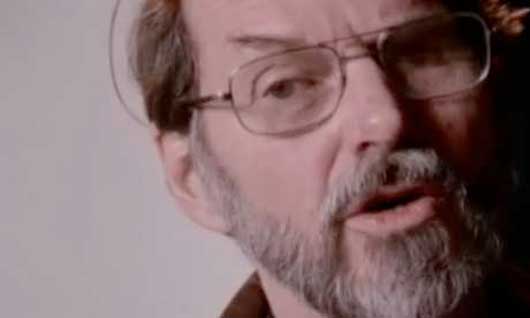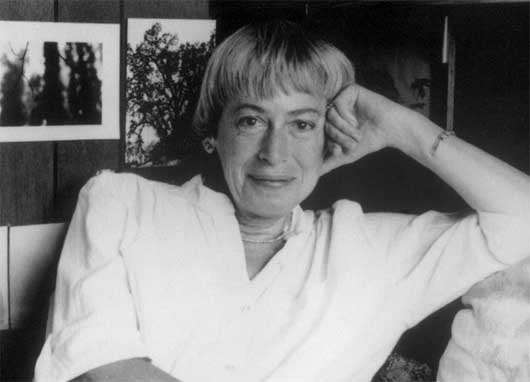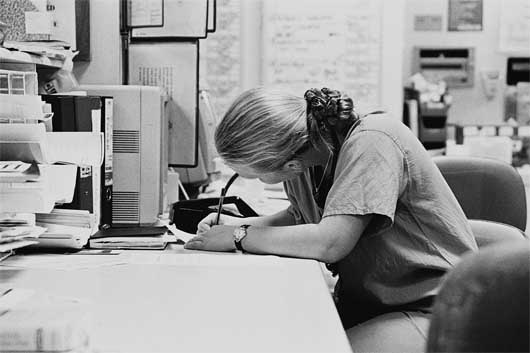 BOOKS
BOOKS In Which We Iterate Upon Ourselves
 Tuesday, February 19, 2013 at 11:50AM
Tuesday, February 19, 2013 at 11:50AM 
To Think Of While Writing
Setting it down is a difficult part, but not the difficult part for the writers who speak below. There is a world that surrounds what we read, and our inquiries into is are so often completely inadequate. Not the how and why of the creative act, but what remains after the writing has been consumed and forgotten like any other artifact.
In a sense there is an existence beyond the page, but it could never really compare.

Vernor Vinge
It was 1962. I was a senior in high school, and I wanted to write about the first man to have a direct mind-to-computer link. I even thought I might be the first person ever to write of such a thing. (In that, of course, I was wrong - but the theme was rare compared to nowadays.) I worked very hard on the story, applying everything I knew about writing, I put together a social background that I thought would make things interesting where the story sagged: cheap fusion/electricity converters had been invented (that worked at room temperature!), trashing the big power utilities and causing a short term depression. And of course, there would be experiments with chimpanzees before the IQ amplifier was tried on my human hero.
Having thought things out, I described the plot to my little sister (a tenth-grader). She suffered through my endless recounting, and then remarked, "Except for the part about the chimpanzee, it sounds pretty dull." What a comedown. Still… she had a point.

Diane Williams
Very early on, I had a vision of excellence and a sense of responsibility of monstrous proportions.
It is best if no one ever sees me again. (You will thank me.)
I will not go to see someone just because he or she is inconveniently located.
And, if you do that thing again, evil people will be ruined completely. Good people will feel great. Springtime will span the year because that's my decision. Anyone who would have preferred some other season may feel a not-so-serious mistake has been made.
When the good people begin their lavish new life, they will be especially indebted to Ira, who will provide everyone with a set of easy instructions to follow so everything turns out all right for them. Oh, they will be indebted to Ira.
I used to see a lot of this one woman. Ira will take care of her, because I've had it up to here.
Now, do you understand?

Hart Crane
For some time past I have been seeking employment in New York, but without success so far. It's the usual problem of mechanical prejudices that I've already grown grey in trying to deal with. But all the more difficult now, since the only references I can give for the last two years are my own typewriter and a collection of poems.
I am, as you probably recall, at least avowedly - a perfectly good advertising writer. I am wondering if you would possibly give me some recommendations to the publicity department of The Metropolitan Opera Company, where I am certain of making myself useful. I was in New York two days last week, trying to secure emplyment as a waiter on one of the American lines. I found that I needed something like a diploma from Annapolis before hoping for an interview.
A few years ago I registered with the Munson Line with reference to my qualifications for a particular position which every ship includes - that of "ship's writer" or "deck yeoman": but I always found that such jobs were dispensed to acquaintances of the captain or to office workers, and that my references were never taken from the file. I am not particular what I do, however, so long as there is reasonable chance of my doing it well. The Aeneid was not written in two years, nor in four.

Robert Creeley
You know the way people say we all have a story within us - something specific in our lives that would, if we could only get it said, be something worth hearing. That may well be true but I don't think art is particularly involved by it. Writing, for example, is an activity dependent on words as material. It may be felt that it matters what they "say" but far more decisive is the energy gained in the field or system they are used to create. In like sense, the "Chef's Special" may sound good to you - but it may be awful to literally eat, and you won't know what it is until someone who does know tells you.
Time is either an imagination or else a phasing inherent in the system, organic or inert (including abstractions). What is your life that you're going to write it down, or make films of it, or whatever it is you had in mind. The one thing clear about your life is that you are living it. Whitman was quick about it, saying, "Who touches this book touches a man."

Mavis Gallant
I still do not know what impels anyone sound of mind to leave dry land and spend a lifetime describing people who do not exist. If it is child's play, an extension of make-believe - something one is frequently assured by persons who write about writing - how to account for the overriding wish to do just that, only that, and consider it as rational an occupation as riding a racing bike over the Alps? Perhaps the cultural attaché at a Canadian embassy who said to me "Yes, but what do you really do?" was expressing an adult opinion.
The impulse to write and the stubbornness needed to keep going are supposed to come out of some drastic shaking up, early in life. There is even a term for it: the shock of change. Probably, it means a jolt that unbolts the door between perception and imagination and leaves it ajar for life, or that fuses memory and language and waking dreams.
The first flash of fiction arrives without words. It consists of a fixed image, like a slide or (closer still) a freeze frame, showing characters in a simple situation.
Stories are not chapters of novels. They should not be read one after another, as if they were meant to follow along. Read one. Shut the book. Read something else. Come back later. Stories can wait.

Mario Vargas Llosa
If the words and the structure of a novel are efficient, and appropriate to the story that the novel intends to make persuasive, this means that its text is perfectly balanced; theme, style and points of view are so perfectly harmonized, and the reader is so hypnotized and absorbed by what is being told, that he completely forgets the way it is being told, and is under the impression that technique and form have nothing to do with it, that life itself animates the work's characters, landscapes, and events, which seem to the reader nothing less than reality incarnate, life in print. This is the great triumph of technical skill in novel writing: the achievement of invisibility, the ability to endow story with color, drama, subtlety, beauty, and suggestive power so effectively that the no reader even notices the fabrication exists; under the spell of its craftsmanship, he feels that he is not reading, but rather living a fiction that, for a while at least and ad far as he is concerned, supplants life.

Harry Mathews
Unless I am hopelessly mistaken, it seems to me perfectly possible to write well in French simply by writing correctly - by writing well I obviously do not necessarily mean elegantly or brilliantly; I mean only that there exists a normative written language available to anyone who takes the trouble to learn it that will enable its user to write prose than can be universally read without objections. Such a "correct" language does not exist in America (or in England for that matter). Left to itself, merely correct American English tends to go flat. American writing of any kind has a kind of ad hoc quality about it, a quality of having been improvised for the occasion; and good writing invariably involves the admixture of a particular individual manner.

Gene Wolfe
At this point it is traditional to state dogmatically that every short story must show a beginning, a middle, and an ending - the lash employed by editors and other critics to flog writers. And it is true enough that every story should, although it is not of much use to know it. Authors (and they are very rare) who commit stories lacking one of the three necessities always believe the missing element present; and the truth is that a good story must have much more than that.
You are both a woman, amused by men, and a man, enthralled by women. You realize that is is only in our own time that life has become easy enough to permit a handful of us to abrogate our ancient alliance. Your lively imagination is governed by reason; you find it difficult to make friends, though you are a good friend to those you have made. At certain times you feel you are insane, at others than you are the only sane person in the world. You are patient, and yet eager.

How and Why To Write
You can find the first five parts of this series here:
Part One (Joyce Carol Oates, Philip Levine, Thomas Pynchon, Gertrude Stein, Eudora Welty, Don DeLillo, Anton Chekhov, Mavis Gallant, Stanley Elkin)
Part Two (James Baldwin, Henry Miller, Toni Morrison, Kurt Vonnegut Jr., Margaret Atwood, Gertrude Stein, Vladimir Nabokov)
Part Three (W. Somerset Maugham, Langston Hughes, Marguerite Duras, George Orwell, John Ashbery, Susan Sontag, Robert Creeley, John Steinbeck)
Part Four (Flannery O'Connor, Charles Baxter, Joan Didion, William Butler Yeats, Lyn Hejinian, Jean Cocteau, Francine du Plessix Gray, Roberto Bolano)
Part Five (Rosmarie Waldrop, Joyce Cary, Fernando Pessoa, Martin Amis, Lewis Carroll, Margaret Atwood, Ursula K. Leguin)































